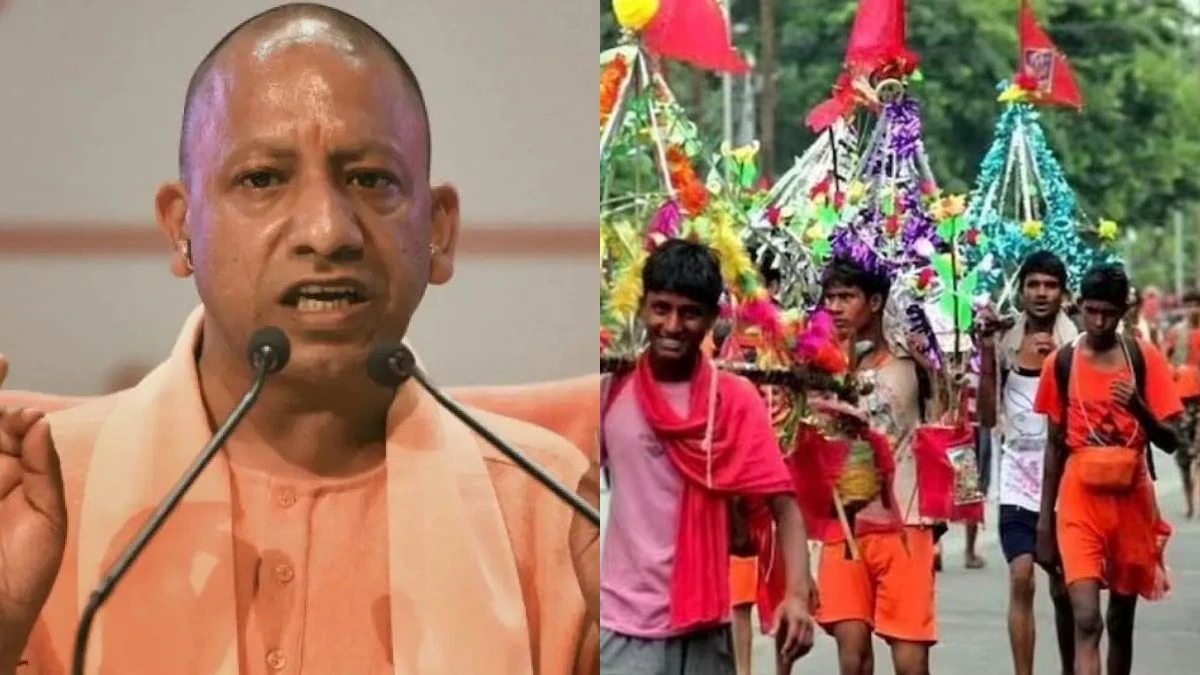Kanwar Yatra 2024, an annual pilgrimage for the devotees of Lord Shiva, in India, is a well-known Hindu festival where millions of Shivbhakts fetch water from the holy river (mostly Ganga – but in different parts, the river might be different) and offer it on the Shivling as a form of worship. This practice is widely observed across the country with great charm. In recent years, the yatra has been the talk of cultural politics and the reasons are not all good. This blog talks about these reasons, as we unfold what is happening around.
1. What is the context of Kanwar Yatra?
As we know in simple terms, it is about fetching holy water and worshipping lord Shiva by offering it to him in the month of Shravan. The actual Kanwar is carried by balancing the middle of the pole on one or both shoulders by devotees, not one but many. This makes it a group activity or a procession that many aspire to become a part of. Likewise, there are groups of people who bring the holy water in the Kanwar from far away, one after the other, and hence it becomes Kanwar Yatra(Procession) like a parade.
2. Why is the Kanwar Yatra celebrated?
The Hindus believe that during Samudra Manthan, the poison that came out of the churning was consumed by Lord Shiva (Making him the Neel-Kanth – one with blue throat due to poison consumption) as nobody else could bear the negative energy of it. Later, to abete its effect, Ravana, a devout of Lord Shiva fetched the holy water of Ganga and offered it to Mahadev (Lord Shiva) and since then, this has been a tradition for thousands of years.
3. What is special about Kanwar Yatra 2024?

The yatra is prominently at the centre stage when we focus on the route of the Yatra in Uttar Pradesh, particularly in Muzaffarnagar because the regulatory bodies for that route have issued instructions that raised eyebrows for many. The administration wants to know every enterprise owner who crosses the path in the yatra. Not only does it want the information for itself, but the directions are also to exhibit the real names of the business owners to the public who is likely to avail services from them.
4. Why is it a matter of concern for us Indians?
We live in a country where anything can become a controversy but this time it took a weird turn when the opposition parties started giving it a communal angle labelling this notification as anti-muslim or Islamophobic. This has come after many started talking about how this will prevent Hindus from buying stuff from Muslims and how it is disturbing the social fabric of the festival in a secular country like India. Check out what politicians have to say about this rule in the article by India Today
5. How does it affect future politics along with Kanwar Yatra 2024?
While this is the latest that the orders have been revised now and it is clear that business owners have free will to decide whether they have to display their name/identity during Kanwar Yatra 2024 it is a clear indication that something might be cooking inside that has brought this smoke up. Check here to read the latest revised order updates by the Indian Express.
If we dig deeper, we understand that this has come after several instances reported by Hindu devotees in Uttarakhand (Dev Bhumi) and even in Jammu where Mata Vaishno Devi’s devotees have also faced similar situations where the business name of the shop is a Hindu name on display but the actual owner of the shop is not a Hindu, mostly, he/she is a Muslim.
This is affecting the political situation in the space by creating a divide deep inside the mindset of the masses.
6. How does this create a problem?
There is no problem if a Muslim wants to sell his goods at a Hindu place of worship, where Hindus buy stuff with open hearts but the problem starts when you hide it under a disguise and get caught doing it. Whatever could be the reason behind it, why does social misrepresentation occur here?
We can spot a similar pattern during Navratri, where cases have been registered against Muslim youth for disguising themselves as Hindus to participate in Garba (a worship dance where Hindu men and women perform together in front of the Goddess) and harassing women of the latter community.
We are not drawing parallels here but this similarity couldn’t escape our scope of research.
7. Is this Islamophobia on the ground?
Well, we mentioned a few examples before, about why this has come to surface. Hindus previously bought items from Muslims without concern only until the videos of vendors licking, spitting and urinating on the edibles for sale became viral. This happened prominently during the COVID-19 pandemic and the series continues to date. By face value, this order did NOT seem Islamophobic but the atmosphere created at the moment could make us perceive so. We do not believe until anything is fact-based. You are requested to keep your eyes open too.
8. Is the government doing it on purpose?
As we said, our stance is clear – Disguising is in nobody’s interest. There are reasons to doubt and this government thinks more for the welfare of Hindus than any of the previous ones but clearly, the government has not created this line of divide. It was created by social media awareness and the government and the opposition are sailing on either of the waves here. We bring you the piece through our lens.
While the rules keep changing, we would like to know what your thoughts are about Kanwar Yatra 2024 and this shapeshifting strategy that a few Muslims are playing to get under the skin of Hindus.